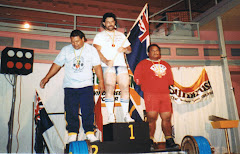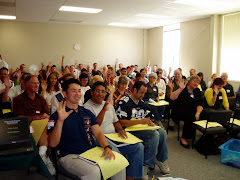
When asked to assist in realigning a team that has either minor or a major conflict within it, one of the most common requests is for those in the team to be willing to apply the "Golden Rule". This is one of the key rules of engagement that they wish to use as a guiding principle to begin to be more engaged positively with one another and get back to being a team, achieving the primary purpose they were formed for. This could be to win a national title, as in a sports team or to maximise their productivity, as a corporate team.
The golden rule (GR) is the rule that states, and in my own words, "...to treat others as you would like to be treated yourself...". This rule appears in one form or another across numerous cultures and religions on our planet. It has been around for many thousands of years, and in my own opinion, is as relevant today, as it was way back then.
In working with this rule as a facilitator, I have found the GR requires a number of considerations that need to be present to make it work effectively resolving how a team will use it to modify the way they interact with each other in a new and more empowering way, hopefully!
For the GR to work these are a few of the principles that I use to integrate it successfully:
The assumption the the GR has is, we assume that we both would like to be treated in the same manner. What I have found is no 2 people wish to be treated necessarily the same way as each other in the same situation. Nor do 2 or more people have an understanding of how each of them wish to be treated, at least not without prior agreement.
Initially for the GR to work we need to have a clear understanding of how each of us like to be treated. Otherwise we are at best, guessing for the other person and impossing our own model of the world on them. If you wish to avoid this, and make the GR stick, use these 3 stages to begin the realignment of the team to begin honoring the GR
Stage 1: Understand: Initially what I suggest is a slight change to the GR, which would read "...let me understand how you would like to be treated so I can begin to treat you that way..." This will require you to each share specifics on how you wish to be treated. It requires you to get to know one another. For some in the corporate sector, suprisingly, getting to know each other is a new concept! But know each other we must for the GR to begin to work.
Stage 2: Empathy: Develop and grow empathy towards the other person. Once we begin to get to know the person we can then begin to get a sense of, and an understanding of, what they like and do not like. This allows us to bridge the gap between what I like and they like. This is the ME - YOU model of relationship building. (more about that model in later writings).
While developing empathy for how others think & feel you can also draw into focus a touch of acceptance and allow that to grow also. Begin to accept that others are different from you, and may not wish to be treated in the "same" way as you do. Once you have a description and agreement between each of those involved you can then monitor progress and adapt as required to fine tune the GR's effectiveness for the team.
Stage 3: Contrast Analysis: Ask the question "How do I like to be treated and how do they like to be treated?" Notice the differences between the 2 mindsets (ME & YOU) and meet them with their needs not yours in a specific context you face together.
Example: The GR can go astray in this instance. When I have a different way of wanting to be treated than you. i.e. I like to be confronted face to face if any of my team members has a problem with me, and I will confront others who I have a problem with be, face to face!
This may work well for the one who likes to confront the other and do exactly the opposite for the person who prefers to take time and discuss the problem with others or thinks that a face to face meeting, when a problem arises, without a mediator present, is a highly confrontational situation and will further escalate the problem between the 2 team members!
Hopefully you get my point. The GR requires some intermediary stages before a team can take on the original meaning of "...to treat others as you would like to treated..." to do this successfully requires a close realtionship with many components present to make it a truley Golden Rule.
To know more about how to facilitate conflict between team members and apply the golden rule with a team setting, contact me directly.
The golden rule (GR) is the rule that states, and in my own words, "...to treat others as you would like to be treated yourself...". This rule appears in one form or another across numerous cultures and religions on our planet. It has been around for many thousands of years, and in my own opinion, is as relevant today, as it was way back then.
In working with this rule as a facilitator, I have found the GR requires a number of considerations that need to be present to make it work effectively resolving how a team will use it to modify the way they interact with each other in a new and more empowering way, hopefully!
For the GR to work these are a few of the principles that I use to integrate it successfully:
The assumption the the GR has is, we assume that we both would like to be treated in the same manner. What I have found is no 2 people wish to be treated necessarily the same way as each other in the same situation. Nor do 2 or more people have an understanding of how each of them wish to be treated, at least not without prior agreement.
Initially for the GR to work we need to have a clear understanding of how each of us like to be treated. Otherwise we are at best, guessing for the other person and impossing our own model of the world on them. If you wish to avoid this, and make the GR stick, use these 3 stages to begin the realignment of the team to begin honoring the GR
Stage 1: Understand: Initially what I suggest is a slight change to the GR, which would read "...let me understand how you would like to be treated so I can begin to treat you that way..." This will require you to each share specifics on how you wish to be treated. It requires you to get to know one another. For some in the corporate sector, suprisingly, getting to know each other is a new concept! But know each other we must for the GR to begin to work.
Stage 2: Empathy: Develop and grow empathy towards the other person. Once we begin to get to know the person we can then begin to get a sense of, and an understanding of, what they like and do not like. This allows us to bridge the gap between what I like and they like. This is the ME - YOU model of relationship building. (more about that model in later writings).
While developing empathy for how others think & feel you can also draw into focus a touch of acceptance and allow that to grow also. Begin to accept that others are different from you, and may not wish to be treated in the "same" way as you do. Once you have a description and agreement between each of those involved you can then monitor progress and adapt as required to fine tune the GR's effectiveness for the team.
Stage 3: Contrast Analysis: Ask the question "How do I like to be treated and how do they like to be treated?" Notice the differences between the 2 mindsets (ME & YOU) and meet them with their needs not yours in a specific context you face together.
Example: The GR can go astray in this instance. When I have a different way of wanting to be treated than you. i.e. I like to be confronted face to face if any of my team members has a problem with me, and I will confront others who I have a problem with be, face to face!
This may work well for the one who likes to confront the other and do exactly the opposite for the person who prefers to take time and discuss the problem with others or thinks that a face to face meeting, when a problem arises, without a mediator present, is a highly confrontational situation and will further escalate the problem between the 2 team members!
Hopefully you get my point. The GR requires some intermediary stages before a team can take on the original meaning of "...to treat others as you would like to treated..." to do this successfully requires a close realtionship with many components present to make it a truley Golden Rule.
To know more about how to facilitate conflict between team members and apply the golden rule with a team setting, contact me directly.
email: col@ignition.org.nz

















































No comments:
Post a Comment